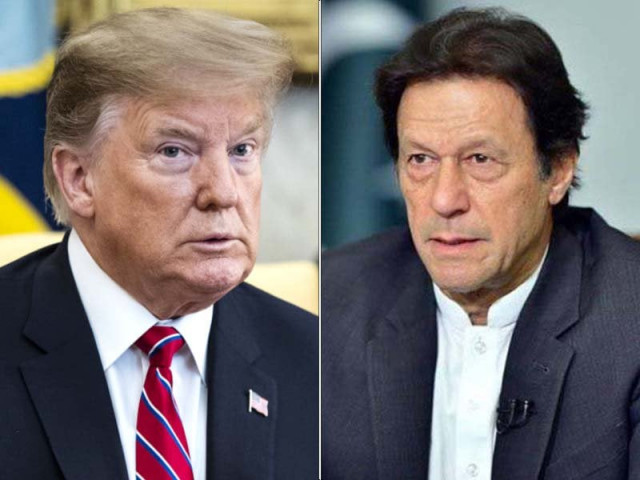Off to White House
Despite bilateral relations seeing the lowest ebb, this interaction could be a new beginning

A collage of Prime Minister Imran Khan and US President Donald Trump. PHOTO: FILE
The pattern speaks of the compulsion the US feels for Pakistan. There is nothing which bounds Pakistan and the US together (especially when the relations have seen a dead-end in recent times) but Afghanistan. For now, Americans are satisfied with the role they have given India under their wider Indo-Pacific strategy. But Afghanistan is one area where the US, especially Trump, is desperate to make an exit through a deal while it believes that Pakistan still exercises a level of control over certain factions in Afghanistan. So, from one perspective, this continuous push and pull is natural, one-sided, need-based and issue-centric. Besides, the kind of role Pakistan plays in facilitating an American-desired (as thought) outcome in Afghanistan will set the balance of reward and punishment for future course.
For Pakistan, positions to maneuver are limited, but if handled tactfully, they can yield results. Our approach to conflict in Afghanistan has an India-centric dimension. And also, there are too many factions (who have started getting empowered) to handle now. Afghans see our focus incompatible with question of their independence and sovereignty. While many interpretations are drawn of Pakistan’s control over the warring factions in Afghanistan, the Afghan goodwill is what Pakistan now needs more than ever before. So for now, it is either you provide a solution or you provide a solution but nothing else.
The peace talks have reached another stage. Where once, there were distant prospects of any possible intra-Afghan interaction, sponsored by Qatar and Germany, talks are currently underway. Though any major breakthrough is unlikely, the policy of the Taliban to negotiate and fight at the same time and its subsequent acceptance in the US (hint: continuation of talks) does narrate the unusual tale of American compromise. Well, it was never imagined.
Despite the bilateral relations seeing the lowest ebb, this interaction could be a new beginning in the US-Pakistan relationship. Being a symbol of change, Prime Minister Imran Khan has represented Pakistan internationally before, though in an entirely different domain. But that too demanded strategy, calm of a kind and play. Similar is this case now. The Prime Minister has worked a cut-out for him but he can attribute this transactional relation, a new dimension. Whereby there is a need to secure Pakistan’s national interests out of diplomatic maneuvering, focus must be onto finding a middle ground for cooperation. The past practice of either being completely subservient or otherwise did the damage.
None can challenge the global status of the US and that of Pakistan as a country with major potential to grow. The homework is expected to be done by both sides, but policy input must be with the Premier and a thought must be given to the major challenge that what other particular dimension the bilateral relations can take (if Afghanistan sees some sort of settlement), the American administration also adheres to it.
Published in The Express Tribune, July 15th, 2019.
Like Opinion & Editorial on Facebook, follow @ETOpEd on Twitter to receive all updates on all our daily pieces.














COMMENTS
Comments are moderated and generally will be posted if they are on-topic and not abusive.
For more information, please see our Comments FAQ